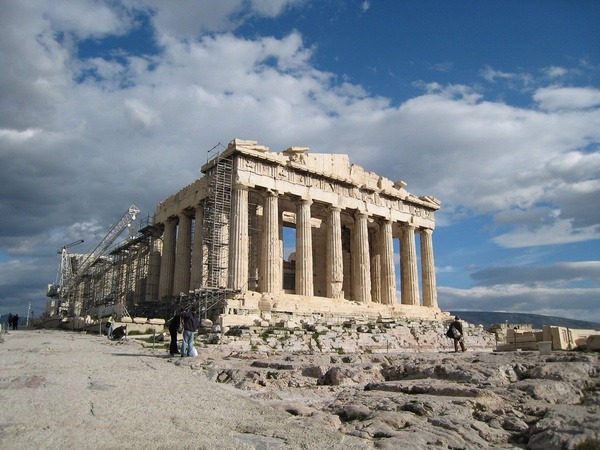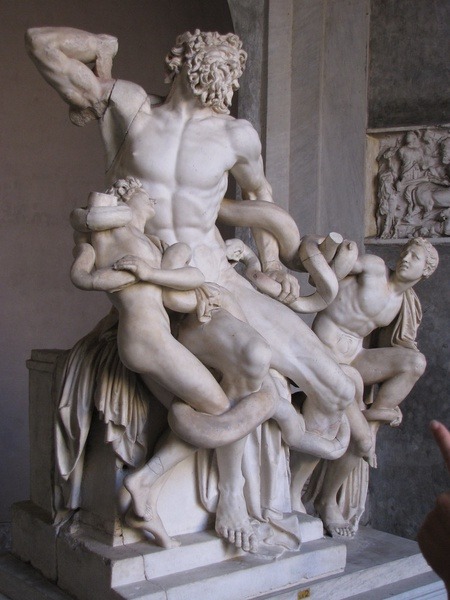search
date/time
 | Yorkshire Times A Voice of the Free Press |

Paul Spalding-Mulcock
Features Writer
@MulcockPaul
10:52 PM 3rd March 2021
arts
It's All Greek To Me !

The Parthenon, Athens
Ancient Greek culture and the panoply of paradigms underpinning it was predicated upon the sincere belief that only a semi-permeable membrane separated mortals from the deities judiciously worshipped and feared. Osmosis articulated not by saline, but the errant misconduct and capricious whims of both mortals and immortals alike. Such a richly imaginative tableau of autocratic, yet often antithetical beings provided an equally verdant stock of tales, fables, parables and of course myths.
Entertaining, didactic or simply cathartic, these myths have seeded themselves into the Anthropocene epoch and live within the canon of Western literature both as conspicuous bricks and mortar of its culture and as muses unconsciously pervading its artistic sensibilities.
Fruity frolics full of blood and gore, melodramatic mayhem, infantile imaginings, yet Greek mythology perdures in our cultural psyche to this day. Vast tracts of literature’s mighty canon are directly informed or inspired by Greek Mythology. Indeed, it’s a tenable if not impregnable argument that almost any modern story owes a debt in one form or another to the Hellenistic scribblers foreshadowing their plots, literary devices and dramatis personae.

Medea Sarcophagus
A spirited romp along the banks of this literary river from source to sea, is therefore in order! The poetic epics of Homer and the tragedies and dramas of Aeschylus, Sophocles and Euripides gave us both literary conventions and characters impervious to the forces of time itself - Odysseus, Hercules, Helen of Troy, Theseus, Jason and his Argonauts and Achilles to name but a few. Then innumerable monstrous manifestations of malignant malfeasance spring to mind. Medusa, the Minotaur and his Labyrinth, the Lernaean Hydra, Harpies, Sirens and Cerberus the flesh-eating hound of Hades. The Nimean Lion with his impenetrable hide, and Polyphemus the easily tricked and blinded Cyclops demand recall.
Stories of delicious betrayal abound, presided over by no less than deceitful deity Apate herself - Agamemnon and Clytemnestra, Atreus and Thyestes, Jason and Medea and Aeneus and Dido; Paris, Helen and Menelaus only rivalled by Jocasta and her son Oedipus. We have the joys of endlessly riveting adventures such as the Labours of Hercules and the punishments befalling those who dare annoy the Gods; Sisyphus and his recalcitrant boulder; Cassandra and her unheeded prophesies and Zeus’s ruthless treatment of the hubristic Bellerophon and his winged steed Pegasus. Throw in the Delphic Oracle and Penelope and her box and one readily sees the appeal and legacy of the myths and their undeniable influence upon both readers and artists even to the present day.
On with our jaunty romp! The Renaissance saw a rediscovery of classical antiquity. Ovid, though a Roman poet, fundamentally influenced the poets and artists of this myth-embracing epoch. Botticelli’s Birth of Venus, Raphael’s Galatea and the works of Leonardo da Vinci and Michelangelo all reflected a preoccupation with, and veneration for, Greco-Roman mythology. With Latin translations, the myths permeated the writing of Petrarch, Boccaccio and Dante.

Laocoon and His Sons
The Restoration saw Dryden as the dominant force in English literature, calling forth Sir Walter Scott to crown him with the epithet ‘Glorious John’. From Dryden we received the analysis of Aristotle’s Unities and the very structure and literary mechanics of tragic play genre. He gave us the Heroic Couplet and won the praise of Samuel Johnson, his poems finding their way into the age’s zeitgeist and the works of notables such as Henry Fielding. Dryden’s Oedipus: A Tragedy (1679) was a hugely successful adaptation of Sophocles’ Oedipus Rex.
The eighteenth-century saw the Enlightenment eschew pure adoration of the myths themselves, placing the focus upon the scientific and philosophical achievements of the Greeks instead. Still the myths persisted in musical form via the libretti of those scribbling for Handel and Mozart. Goethe revived Greek tragedy in Germany with Jean Racine celebrating Greek literature in France.
The advent of Romanticism catalysed an appetite for all things Hellenistic. New translations of Homer inspired contemporary poets such as Keats and Byron, even dripping from the pen of Queen Victoria’s poet laureate, Alfred Lord Tennyson. His portraits of the court of King Arthur, though a quintessentially ‘English’ subject, are gilded with echoes of the Homeric epics.
And of course we can’t forget the cultural cupidity of Thomas Bruce, Seventh Earl of Elgin. His agents acquired the Parthenon Marbles during the years 1801 -1812 and they now reside in the purpose-built Duveen gallery in the British Museum. This rich collection of the works overseen by Phidias remains a testament to the allure of Greek classical culture and its artistic outpourings.

John Dryden by Sir Godfrey Kneller
However, all things have their time…In 1979, the French philosopher Jean Francois Lyotard pronounced that nobody believed in myths anymore. After World War Two, faith in over-arching myths or ‘meta-narratives’ had evaporated causing the public zeitgeist to distrust religion, government and classical mythology. Postmodernism filled the void placing an emphasis upon the search for personal truth. Its acolytes chose to deliberately scupper clean chronological timelines and employed literary devices, not to clarify but to discombobulate. In a state of unfamiliar confusion, the reader would experience no longer being able to self-actuate by reference to mythologies and their systems. The American Marxist literary critic Frederic Jameson would go on to argue that postmodernism itself was simply another ‘myth’ !
Also by Paul Spalding-Mulcock...
Word Of The Week : CorpusThe Gallery, Slaithwaite: ‘Ten’ - A Birthday ExhibitionWord Of The Week : SibilantWord Of The Week : PropinquityWord Of The Week : IdiosyncrasyIt might be ‘all Greek to me’, however picking up almost any book is likely to some degree, to render the words on its pages Greek to you, at least in creative provenance! Familiarity with these wonders of the literary firmament certainly can’t do any harm and, for this reader, undoubtedly amplifies my love for, and attempts at understanding, the stories I excitedly encounter. An added benefit being that a reasonable knowledge of the Greek myths will be handy when we eventually, like Odysseus himself, return ‘home’ and venture off to the local pub quiz! That said, if your team wins…beware the hubris of Bellerophon!